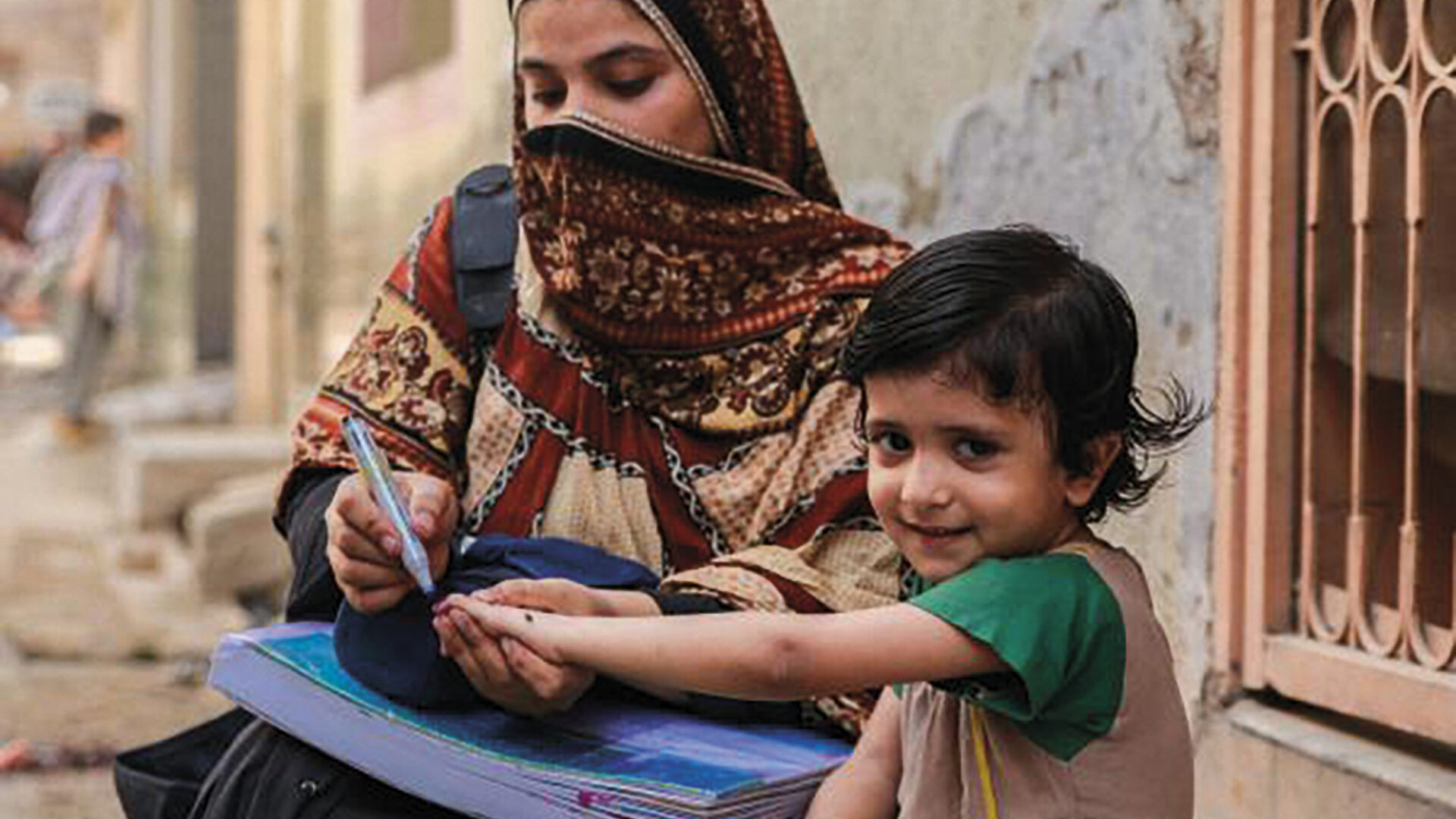With the exciting announcement in January that Pakistan was 12 months wild poliovirus free, editor of India’s regional Rotary magazine, Rasheeda Bhagat, speaks with TRF Trustee and Pakistan National PolioPlus Committee Chair Aziz Memon, as well as four regional polio chairs, about the challenges they’ve faced and what this milestone means for Rotarians across the globe.
By Rasheeda Bhagat
Editor, Rotary News India
On January 27, 2022, Pakistan reported an entire year – 365 days – without a single wild poliovirus case.
What this means to Rotarians across the world, who have been fighting the Herculean task of ridding the world of polio for over three long decades, can be seen in the congratulatory note TRF Trustee and Pakistan National PolioPlus Committee Chair Aziz Memon received from RI headquarters. Addressed to the Rotarians of Pakistan and signed jointly by RI President Shekhar Mehta and TRF Trustee Chair John Germ, it congratulated them on reaching this historic milestone.
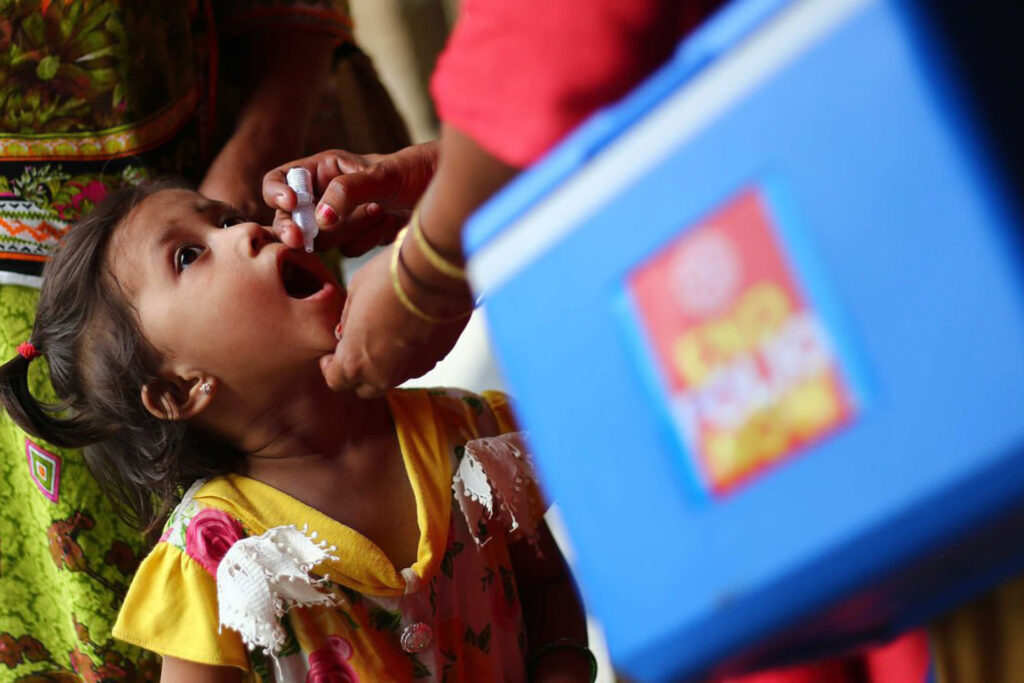
“For the first time in our decades-long fight to eradicate polio, Pakistan has gone a full year without a report of a single child being paralysed by the wild poliovirus. As one of the last two remaining wild polio-endemic countries, Pakistan’s milestone represents meaningful progress and proves that a polio-free world is possible and within our grasp.”
But Pakistan’s Rotary leaders are wary of celebrating just yet.
“Going back to the defining moment when Rotary’s polio immunisation drive in Pakistan got traction, Aziz recalled the day then Pakistan Prime Minister Benazir Bhutto gave the first dose of polio vaccine to her own daughter.”
“We are not even accepting the congratulations that have poured in from across the world… from Rotarians, Rotaractors, our partners and others,” said Aziz. “Even while marking this momentous day, we know that we must be vigilant, and that this is not the end but the beginning. We can’t afford to be complacent and will have to continue to work with our partners and the government to ensure there is no relapse, as happened in Nigeria after 21 months.”
Despite this sense of caution, there is more encouraging news from the region.
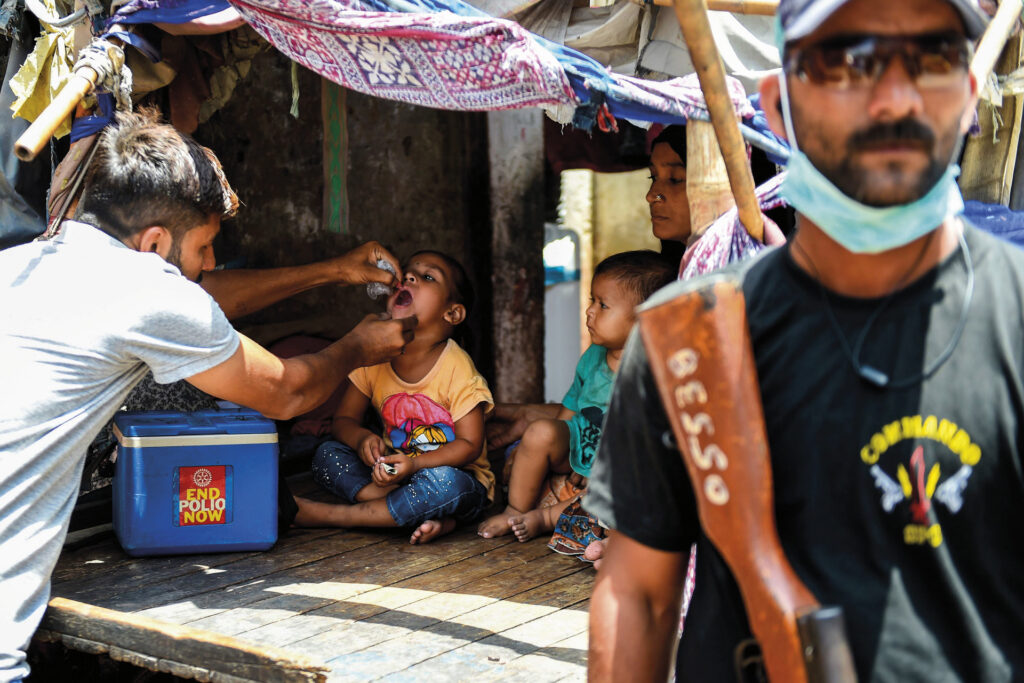
Last year, Afghanistan reported four cases of polio and, with Pakistan and Afghanistan sharing a common border, this will remain one of their biggest challenges. However, in a Zoom interview with Pakistan’s core PolioPlus leadership team, it was revealed that dialogue with the Taliban, which has historically been opposed to immunising children against polio, has seen a change of heart.
“A major change we see these days is that the new government of Afghanistan (the Taliban) is allowing polio workers to go from door-to-door to give polio drops,” said Punjab Polio Zonal Coordinator PDG Muhammad Saeed Shamsi.
“And this has been going on for four months now,” added Aziz. “Earlier, in that region, there used to be a designated Hujra, or a gathering place, where the polio vaccinators could come and the families would bring their children below the age of five to get vaccinated. But this has now been changed by the Taliban to a door-to-door vaccination, something that Rotary has always asked for, but was neither permitted nor possible earlier.”
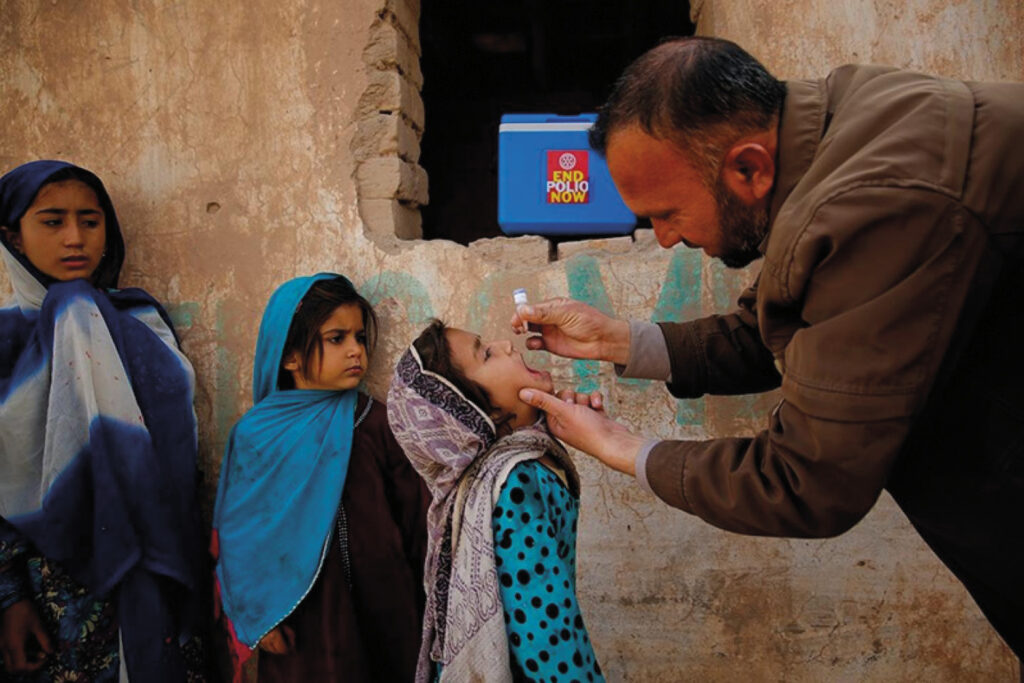
Asked about some of the other challenges the core polio team faced in getting to the one-year milestone, Aziz said: “There were both moments of hope and frustration. At times we felt so close to eradicating polio. For example, in 2018 we got only single digit cases and felt we were reaching the end, then suddenly a conspiracy theory was raised by a religious party in Peshawar.”
The rumour was that 50 children had died after being administered polio drops.
“The truth was that nobody had died. So, we were fighting not just insurgency, but also religious misbeliefs.”
Going back to the defining moment when Rotary’s polio immunisation drive in Pakistan got traction, Aziz recalled the day then Pakistan Prime Minister Benazir Bhutto gave the first dose of polio vaccine to her own daughter, Asifa, in 1994.
“That is the time this program got national prominence.”
Historically, the Taliban has also played a role in Pakistan’s fluctuating polio case numbers.
At one point, the number of cases were much lower than in India. But then the Taliban insurgency began in Pakistan and with refugees moving in from Afghanistan the number shot up to 380.
After Osama bin Laden was killed in 2011, the Taliban was occupying north and south Waziristan in the Khyber Pakhtunkhwa (KP) province, of which Abdul Rauf Rohaila is the Zonal Coordinator, and put a ban on polio vaccinations.
“I went there and held a discussion with the Taliban to allow polio vaccination, but their only demand was that we stop the drone strikes,” Abdul said. “That was the worst time Pakistan faced in its polio eradication drive.”
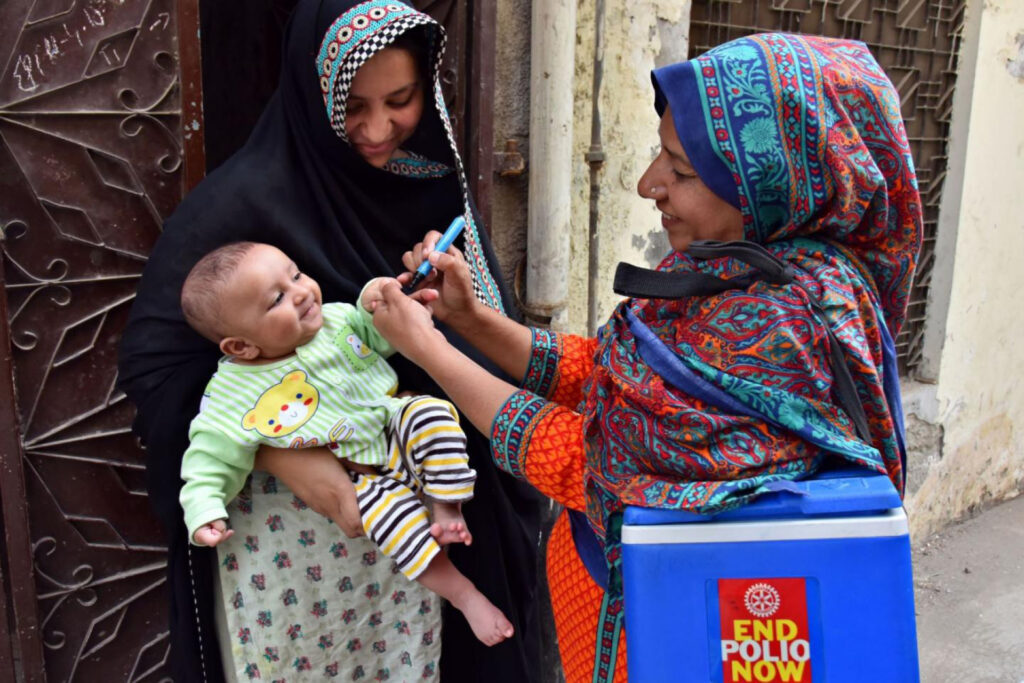
Things turned for the better when the army increased its presence in the NW region, especially after the December 2014 attack on an army school in Peshawar by six gunmen affiliated with the Tehrik-i-Taliban Pakistan (TTP), in which 132 children died. The Pakistan Army launched an offensive and polio vaccination was allowed. The number of polio cases started coming down.
The KP province has always been the most problematic; law and order is a major issue and killings take place frequently. Rotarians had to, and continue to, deal with insurgency and security issues, and even as early as three days ago (at time of interview), a policeman guarding the polio workers team was killed in Karak District, KP.
“About 200 polio workers and security men have been killed in our polio eradication drive in KP,” Aziz said. “We do not allow our guests to go there, particularly foreign guests who come for our National Immunisation Days, but if we ourselves don’t go, who will?”
Regarding the misinformation campaign undertaken by the Taliban and some religious leaders about the polio vaccine causing impotence, and how the PolioPlus core team combated this problem, Aziz said they have set up an ulema committee, which conducts regular workshops all over Pakistan to give the right information.
“The drone attacks also lengthened our fight against polio, because after bin Laden was killed the misinformation spread was that information on his location was given by a polio worker.”
“The Pakistan government also helped us by getting ulemas from Mecca and Medina to address meetings and workshops, making it clear there are no religious or medical concerns. The children who take these drops can indeed become fathers and gradually the religious misconception subsided.”
Indeed, Pakistan’s Rotarians have had to grapple with all kinds of misinformation. After Osama bin Laden was killed, a ban was put on OPV (Oral Polio Vaccine) in both North and South Waziristan.
“One of the main reasons was the charge that when the vaccinators come, they do mapping and pass on information to the CIA about where the Taliban or other insurgents are hiding, so they can carry out drone attacks,” Aziz said. “So, the drone attacks also lengthened our fight against polio, because after bin Laden was killed the misinformation spread was that information on his location was given by a
polio worker.”
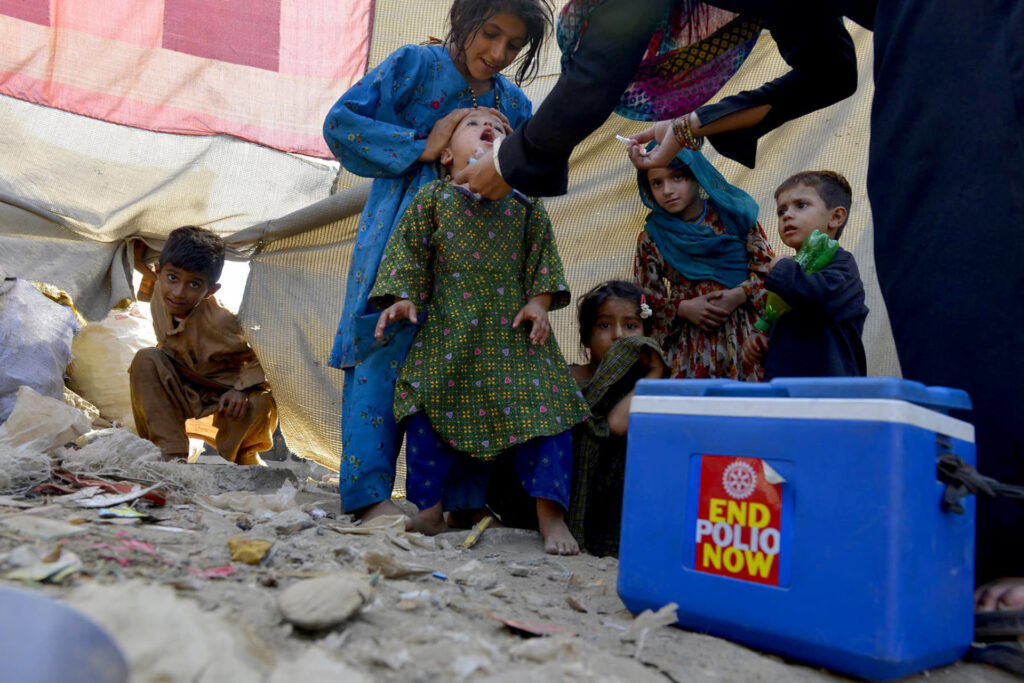
However, once trust was established, the community began approaching Rotarians for help, saying they had no water and no roads.
“Building roads is a huge job that only the government can do, but wherever we could, we have helped the local communities in several ways.
“We’ve set up water filtration plants and conducted several health camps to emphasise the ‘Plus’ in PolioPlus and spread the message that we come not only to give two drops to their children, but also to take care of the health of the whole family.”
Rotarians also conduct polio corrective surgery, with many clubs having permanent centres to rehabilitate those afflicted by polio.
Looking to the future, Aziz underlines the need for vigilance, as “our biggest problem is a high-risk mobile population”.
The permanent transit points (PTPs) set up by the polio immunisation program will ensure precaution is taken when migrants cross from one province to another. In Sindh alone there are 29 such PTPs, PTPs at Punjab province are manned 24/7, and at the Pak-Afghan borders Rotary has set up all-age immunisation posts, where even adults are given drops as they too can be carriers.
The gender conundrum TRF Trustee and Pakistan National PolioPlus Committee Chair Aziz Memon offered an interesting insight into the effects of false propaganda spread throughout Pakistan that polio drops cause impotency. “About four years ago, when the polio case numbers from Peshawar and other regions in KP came up, we found that most were boys. We were wondering what had gone wrong with the immunisation drive and then we discovered that when the polio teams came, the mothers would take only their daughters to get the drops and hide their sons, thinking they will become impotent.” The sad result was some of these boys contracted polio and became crippled. “Before going on every campaign we do a total mapping of how many children are to be vaccinated in a house,” Punjab Polio Zonal Coordinator PDG Muhammad Saeed Shamsi said. “In many cases, we knew that a house had two or three or four children and wanted to ensure all of them got vaccinated. But there were times we were not able to convince the parents.”
No certification yet While Pakistan has gone 12 months without reporting a single wild poliovirus case, it is still some way from receiving certification from RI, as cases are assessed by region. “For example, Sri Lanka became polio-free 18 years and Bangladesh 12 years before India, but both countries had to wait for India to become polio-free for the region to get certification,” Trustee Aziz Memon said. “Pakistan comes under the Eastern Mediterranean Region (EMRO) and needs to wait for Afghanistan to register zero cases before the EMRO will be certified polio-free.”
